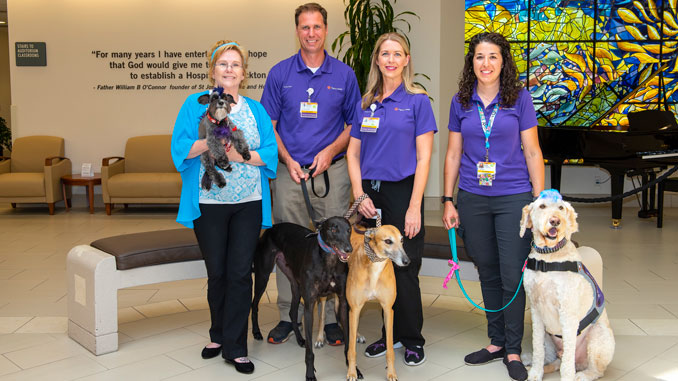
The therapy dog program at St. Joseph’s Hospital spreads joy to patients in need
The motto for St. Joseph’s Medical Center in Stockton is Hello Human Kindness, but the truth is, it’s not just humans spreading kindness-the facility gets a little help from their four-legged friends. In 2013 the hospital launched its therapy dog program and since then dogs have been working the halls to help care for St. Joseph’s patients. And science backs up the practice; studies show that humans undergo immeasurable changes while interacting with a trained therapy dog.
The purpose of the therapy dog program at St. Joseph’s is to provide patients with relief from loneliness and anxiety while providing mental stimulation for those suffering from brain injuries. It can also act as a catalyst in the therapy process between doctors and patients.
This powerful program has grown to include 10 human handlers and 11 canine volunteers. These animals spend their volunteer days walking the halls of the hospital and stopping to say hello to anyone that looks curious. Sometimes a staff member needs a little fuzz therapy to perk them up, or maybe the dogs perform tricks for children waiting in the lobby. And often, the day includes posing for pictures with people. Volunteer handlers tend to spend extra time in their favorite parts of the hospital. One handler has an affinity for volunteering in the cancer ward, many enjoy spending time comforting children in pediatrics, and others prefer time spent in the ER. Regardless of the department, the dogs roam looking for anyone needing a smile. For a dog, it’s a pretty good gig.
Leo is one of the 11 volunteer therapy dogs that roams St. Joseph’s, an adorable 100-pound Goldendoodle (a cross between a golden retriever and a poodle) with a colorful hairdo, that delights people with his giant fluffiness and good-natured personality. You can learn more about the Goldendoodle crossbreed by reading this guide that compares Goldendoodle Vs Labradoodle. For his handler, Gabby DiBattista-Capadona, it has been a life-changing experience. Her connection to the hospital is a personal one. Both of her grandparents spent significant amounts of time at St. Joseph’s and she got to know the staff that provided their care. After her grandfather passed away, she found a way to give back to the facility that cared for the people she loved most.
“I volunteer because I want to make people happy and how can you not be happy spending time with Leo?” Capadona says. “He’s warm, inviting, and people smile when they see him coming.” For her, the reward is when she hears a patient or family member say, “That’s just what I needed today,” after a visit from Leo.
But it isn’t all rainbows and butterflies. Didi McElroy, St. Joseph’s volunteer service coordinator, admits that many of the dogs seem emotionally exhausted after a long shift at the hospital. “Our dogs take particular note of people that are in pain, crying, scared, and nervous,” McElroy says. “They want to comfort those people. They empathize with patients and take on people’s emotions.”
Since its inception, the therapy program has had a tremendous impact on the staff and patients at St. Joseph’s Hospital. Annually, over 32,000 individuals, including staff and patients, are touched by the care of therapy dogs.
McElroy’s vision for the program is to show the world that it isn’t about what breed a dog is. At SJMC, the therapy dog team includes a Dutch shepherd, Doberman, border collies, a Havanese, English bulldogs, and so many others. To be a therapy dog you must be willing to approach strangers and seek affection from them. This is not a teachable characteristic-it’s an innate trait, something which the prior list of dogs can possess. For more information on the personalities of different breeds, research further into the different breeds by looking at pages on bichon havanais or other dogs that can possess the traits to become a therapy dog. It is also vital that the dogs are obedient and highly socialized.
The K-9 team is eager to expand, so if you are interested in becoming a volunteer for the program, reach out. Just remember, all SJMC therapy dogs pass testing requirements and are registered with the Alliance of Therapy Dogs, a national organization. Qualified applicants do a walk through at the hospital with McElroy to assure the dog performs well in an acute hospital health care setting, which is different than a retirement home or convalescent setting. And if it’s a good fit, you can begin spreading the canine kindness and compassion to patients in need of a smile.
For more information about how to get involved, contact St. Joseph’s Volunteer Services Department Monday through Thursday at 209-467-6527 or email them directly at [email protected]

